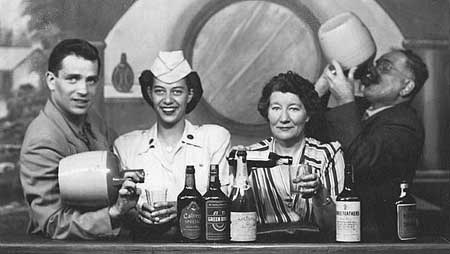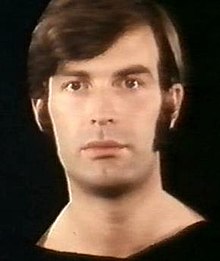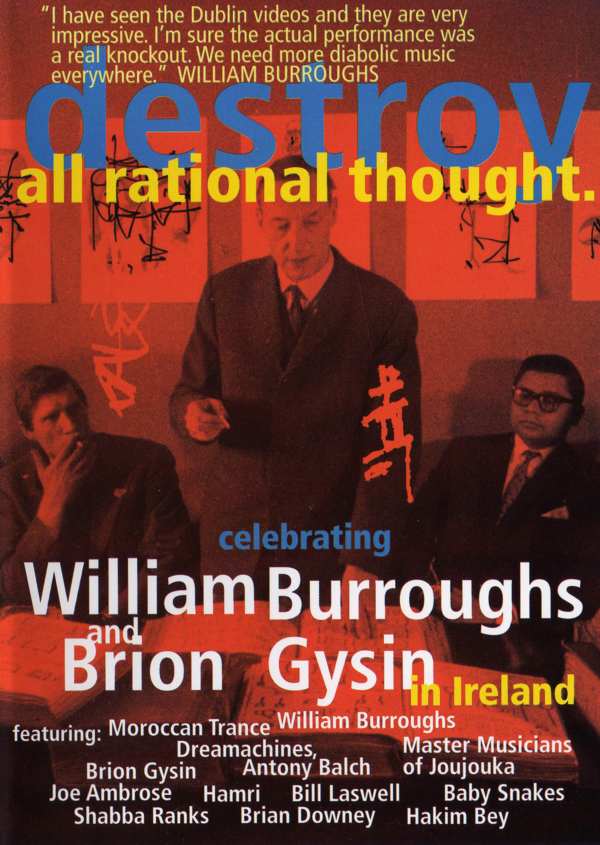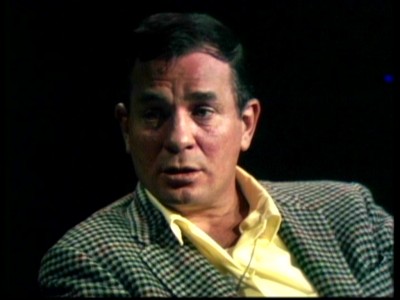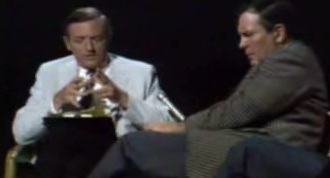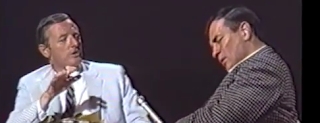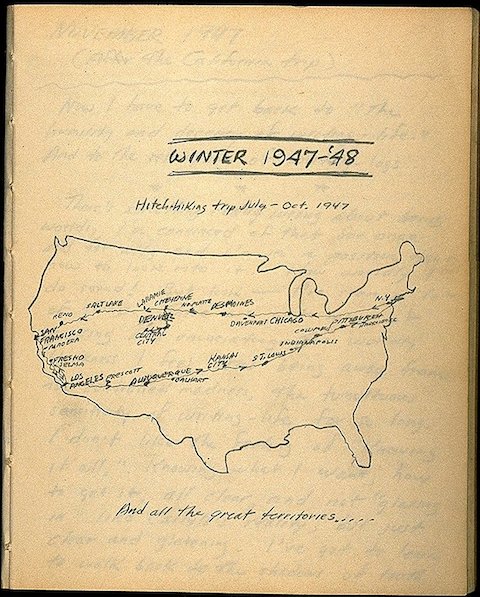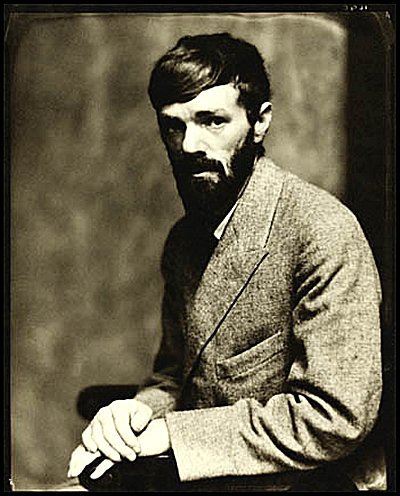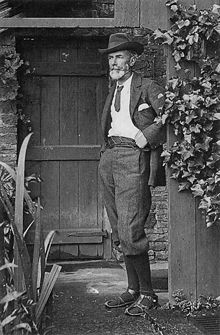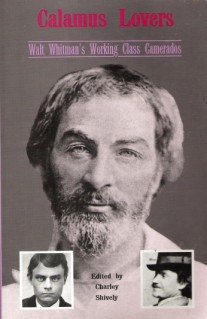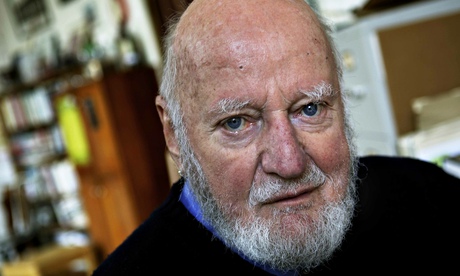
[Hart Crane (1899-1932)]
Then he (Hart Crane) goes directly into an address to Walt Whitman - or, in another section of the poem he has an address to Walt Whitman, in the "Cape Hatteras" section. He quotes Whitman to begin with - " - "Recorders ages hence" - ah, syllables of faith!" - That was one thing he noticed about Whitman. It's rueful - "Walt, tell me Walt Whitman, if infinity/Be still the same as when you walked the beach/ Near Paumanok" - Long Island - "...your lone patrol - and heard the wraith/Through surf, its bird note there a long time falling.../For you, the panoramas and this breed of towers,/Of you - the theme that's statured in the cliff./O Saunterer of free ways still ahead!/Not this our empire yet, but labyrinth/Wherein your eyes like the Great Navigator's without ship/Gleam from the great stones of each prison crypt/Of canyoned traffic...Confronting the Exchange,/Surviving n a world of stocks - they also range/Across the hills where second timber strays/Back over Connecticut farms, abandoned pastures --/Sea eyes and tidal, undenying, bright with myth!" -
Then there's a really interesting mouthy passage of Crane here, describing the Machine Age, which I didn't include (in theExpansive Poetics anthology), but it's a brief thing, so I'll read it - [Allen begins reading] - "The nasal whinw of power whips a new universe.../Where spouting pillars spoor the evening sky,/Under the looming stacks of the gigantic power house/Stars prick the eyes with sharp ammoniac proverbs,/New verities, new inklings in the velvet hummed/Of dynamos, where hearing's lease is strummed.../Power's script, - wound, bobbin-bound, refined -/Is stropped to the slap of belts on booming spools, spurred/Into the bulging bouillon, harnessed jelly of the stars./ Towards what? The forked crash of split thunder parts/Our hearing momentwise; but fast in whirling armatures,/As bright as frogs' eyes, giggling in the girth/Of steely gizzards - axle-bound, confined/In coiled precision, bunched in mutual glee/The bearings glint, - O murmurless and shined/In oilrinsed circles of blind ecstasy!" - Kind of a weird vision - "As bright as frogs' eyes, giggling in the girth/Of steely gizzards" - That's kind of a weird vision of the Machine Age.
He takes up then the Wright Brothers'at Kitty Hawkflight, the invention of the airplane - the "Skygak", as he speaks of it - "..pilot, hear!/Thine eyes bicarbinated white by speed, I Skygak.." - and then he gets back to Whitman - "O Walt" - we have it in replica here - "Ascensions of thee hover in me now" (in) "The stars have grooved.." ("The stars have grooved our eyes with old persuasions.."), that section - [Allen contnues reading] - "O Walt - Ascensions of thee hover in me now/As thou at junctions elegiac, there, of speed/ With vast eternity, dost wield the rebound seed!/The competent loam, the probable grass - travail/Of tides awash the pedestal of Everest." - It's just pure funny language there - "travail/Of tides awash the pedestal of Everest." (I suppose the tides of modernity, the tides of (the) Machine Age) - "..fail/Not less than thou in pure impulse inbred/To answer deepest soundings! O, upward from the dead/Thou bringest tally, and a pact..." - (that's the same as (Ezra) Pound's "I make a pact with you, Walt Whitman" - "...new bound/Of living brotherhood" - [Allen reads on] - "..Thou, there beyond - /Glacial sierras and the flight of ravens,/Hermetically past condor zones, through zenith havens/Past where the albatross has offered up/His last wing-pulse, and downcast as a cup/That's drained, is shivered back to earth - thy wand/Has beat a song, O Walt - there and beyond!..."..."...Thou, pallid there as chalk, Hast kept of wounds, O Mourner, all the sum/That then from Appomattox stretched to Somme.." - From (a) battle of the Civil War to World War I - the Battle of the Somme - [Allen continues] - "Cowslip and shad-blow, flaked like tethered foam/Around bared teeth of stallions, bloomed that spring/When first I read thy lines, rife as the loam/Of praries, yet like breakers cliffward leaping!/ O early following thee, I searched the hill/Blue-writ and odor-firm with violets, 'til/With June the mountain laurel broke through the green/And filled the forest with what clustrous sheen!/Potomac lilies.."..."Heard thunder's eloquence through green arcades/Set trumpets breathing in each clump and grass tuft - til/ Gold autumn, captured, crowned the trembling hill! / Panis Angelicus!.." - (Angelic bread) - "Panis Angelicus! Eyes tranquil with the blaze/ Of love's own diametric gaze, of love's amaze!/Not greatest, thou - not first nor last, - but near.." - So he's saying of Whitman, of all the poets in antiquity, he's not the greatest, nor the first, nor the last, but near, the only one that was near us in America - "And onward yielding past my utmost year/Familiar, thou, as mendicants in public places" - (Familiar as beggars in the town square) - "Evasive - too - as dayspring's spreading arc to trace is -" - (A funny line. A funny rhyme.) - "Our Meistersinger, thou set breath in steel/And it was thou who on the boldest heel/Stood up and flung the span on even wing/Of that great Bridge, our Myth, whereof I sing!/ Years of the Modern! Propulsions toward what capes?/But thou, Panis Angelicus, hast thou not seen/And passed that Barrier that none escapes -/ But knows it leastwise as death-strife? - O, something green/Beyond all sesames of science was thy choice/Wherewith to bind us throbbing with one voice,/New integers of Roman, Viking, Celt -/Thou, Vedic Caesar, to the greensward knelt!" - (So, in this passage, he's praising Whiman for giving place to nature, for pointing back to nature, although (at the same time) accepting the "modern propulsions" toward new invention - modernity, steel, the locomotive and everything. He's saying that, ultimately, Caesar (or Kaiser or King, Master of the Vedas, master of alphabetic epic), kneels down "to the greensward") - "And now, as launched in abysmal cupolas of space," - (with the Space Age, with people going to Mars) - "And now, as launched in abysmal cupolas of space,/Toward endless terminals, Easters of speeding light - .." - (talking about approaching the speed of light, and everything turns into the time changes, so it's like "Easters" - crucifixtions of speeding light)
Student: Resurrections.
Student: Resurrections of speeding light, okay. Resurrections of speeding light. [to the class] - (A) good Catholic boy here! - [he continues] - "Vast engines outward veering with seraphic grace/On clarion cylinders pass out of sight/To course that span of consciousness thou'st named/The Open Road.." - (which is, actually, still the theme of the Kennedy-ian Cape Canaveral flights, "Open Road", basically) - ". .- thy vision is reclaimed!/What heritage thou'st signalled to our hands!/ And see! the rainbow's arch - how shimmeringly stands/Above the Cape's ghoul-mound, O joyous seer!/Recorders ages hence, yes, they shall hear/In their own veins uncancelled thy sure tread/And read thee by the aureole 'round thy head/Of pasture-shine, Panis Angelicus!" - (that is, the light (or) dew-light in pastures, the rainbow light in pastures) - "yes, Walt,/Afoot again, and onward without halt, -/ Not soon, nor suddenly, - no, never to let go/ My hand/ in yours,/ Walt Whiman -/so -" - (At the end, it gets to be very beautiful. After all the rhetoric, it gets to be a very beautiful, heart-felt offering of hand, "picking up the relay", as Gregory Corso would say).
[Audio for the above begins here at approximately seventy-seven-and-a-quarter minutes in and concluding at approximately eighty-seven-and-three-quarter minutes in]







